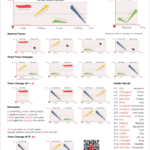Articles in the ‘Intermediate’ category Page 35
-
Learning how to fish: Or, why it’s essential to know how to learn
Learning how to learn Chinese is an essential skill for any student, regardless if you study on your own or in a course. This article explains why going to class is not enough.
Read → -
Two reasons why pronunciation matters more than you think
Good pronunciation matters, whether you like it or not. In general, students (and teachers) tend to stop caring about pronunciation much earlier than they should. You don’t need to aim for native-like pronunciation, but clear and easily-understood Chinese should be the goal of all students. In this article I present two arguments: one about the fact that pronunciation and communication are closely linked, one about how pronunciation reflects both you as a person and your other skills.
Read → -
Focusing on tone pairs to improve your Mandarin pronunciation
When learning to pronounce tones in Chinese, it makes sense to focus on words rather than single syllables. Most words in Mandarin are disyllabic and since practising these will also include tone changes (sandhi), focusing on tone pairs is recommended. This article gives you all HSK and TOCFL words, sorted by tone! First all [first tone] + [first tone], then all [first tone] + [second tone] and so on. This is great for students who need words to practise difficult combinations, but it’s also useful for teachers.
Read → -
Easing yourself into reading novels in Chinese
Reading a novel in Chinese is the goal for many learners, but perhaps it’s easier to accomplish than you think. This article discusses various methods of making novel reading easier in Chinese, mainly focusing on the benefits of re-reading books you are already familiar with and know you like because you’ve read them before in your native language.
Read → -
A language learner’s guide to wuxia novels
Wuxia can be used as a key to both Chinese language and culture. This article is meant to be a guide to second language learners. If you want to read wuxia in Chinese, where do you start? How do you approach these novels? How do I find one which isn’t too hard? You will find the answers here!
Read → -
Wuxia, a key to Chinese language and culture
Wuxia is something genuinely Chinese and is great for learning both about the culture and the language. in this article, Sara K. introduces wuxia to Chinese learners and explains what it is, why it’s relevant for learners and how to get started with wuxia if you find it interesting.
Read → -
25 books I’ve read in Chinese, with reviews and difficulty ratings
I set the goal of reading 25 books in one year. This article is about the 25 books I read and is meant to serve as encouragement and inspiration. You might also find a book or two you want to read yourself! At the end of the article, I discuss my reading habits in general as well.
Read → -
Chinese reading challenge: Read more or die
You don’t read as much in Chinese as you should and January is the month that will change. The challenge starts on January 1st and the goal of reading as much as possible in Chinese in one month. This article contains not only more information about the challenge, but also lots of tips and tricks for reading (more) in Chinese!
Read → -
Chinese immersion with Carl Gene Fordham
It’s widely known that immersion is an effective way of learning languages, but the details are less clear. How do you go about it? This article contains an interview with Carl Gene Fordham, who has many interesting things to say about how he learnt Chinese to an advanced level, as well as how we continued from there and became a translator and interpreter.
Read → -
Role-playing to learn more Chinese and avoid frustration
Focusing on meaning rather than form is usually a good idea. It allows you to communicate as opposed to just do drills, which is only useful in limited doses. However, caring too much about what you want to say rather than how you do it will sometimes make you unable to say much at all. In these cases, role play! You don’t need to answer questions truthfully in class. Exploring questions from different perspectives will not only help you learn more, it’s more fun as well!
Read →








